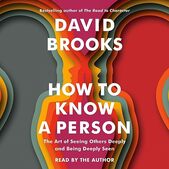One fundamental skill that lies at the heart of any healthy person is the ability to see someone else deeply and make them feel seen - to accurately know another person, to let them feel valued, heard, and understood. Life goes a lot better if you can see things from other people's points of view, as well as your own.
Diminishers make people feel small and unseen with their egotism, anxiety, naive realism, objectivism (detached and dispassionate), essentialism (making generalizations), and their propensity towards the lesser-minds problem (like many people, they think that they are more complicated and deeper thinkers than others).
Illuminators are practiced in the craft of understanding others, they have a persistent curiosity about other people. They show tenderness, receptivity, active curiosity, affection, generosity, and a holistic attitude (knowing people have a spectrum of strengths and weaknesses).
A diminisher makes you think he is interesting; an illuminiator makes you think you are interesting. One illuminator once asked the author about his ultimate goals (what does he want to offer the world?), his skills (what is he doing when you feel most alive?), and his schedule (how does he fill his day? and how well that is aligned with the first two?)
Tips on how to pay attention to a person or how to accompany a person:
- be aware of the other person's timetable, playfulness, & other-centeredness
- treat attention as an on/off switch not a dimmer
- be a loud listener
- favor familiarity (people don't favor the unfamiliar)
- make other people the actors, not the witnesses
- don't fear the pause
- do the looping (repeat what people say)
- assist people in their creation (the midwife model)
- keep the gem statement at the center
- find the disagreement under the disagreement
- don't be a topper
Wise people possess a compassionate understanding of other people, they don't necessarily possess information. Wise people don’t tell us what to do; they start by witnessing our story; more like coaches than philosopher kings.
The author Studs Terkel wrote, "Listen, listen, listen, listen, and if you do people will talk. They always talk. Why? Because no one has ever listened to them before in all their lives. Perhaps they've not ever even listened to themselves."
If you want to thrive in the age of AI, you better become exceptionally good at connecting with others
We are generally only 20% accurate when perceiving what others are thinking in our first conversation with them; and that only raises to 35% accurate with close friends and family. For people who are very good it is high as 55%, but those of us who aren't very good still think we are very good at reading other people.
“Moral formation” is about helping people learn how to restrain their selfishness and incline their heart to care more about others. It’s also about helping people find a purpose, so their life has stability, direction, and meaning. It’s about teaching the basic social and emotional skills so you can be kind and considerate to the people around you.
Before entering into any hard conversation, it’s important to think about conditions before you think about content. Also, for members of dominant or majority groups, there’s usually little or no gap between how others see you and how you see yourself. For people from marginalized or historically oppressed groups, there’s usually a chasm between who you are and how you are perceived.
Conversation take place on two levels: the official conversation (words about the nominal topic at hand) and the actual conversation (ebb and flow of underlying emotions). In a conversation consider its frame: what is the purpose of the conversation and what are the goals.
Bad questions evaluate (I'm about to judge you) and are closed (limit how they can be answered). Sometimes a broad, dumb question is better than a smart question, especially one meant to display how well-informed you are. When you are asking a good question, you are adopting a posture of humility. You're confessing that you don't know and you want to learn. You are honoring a person.
Big questions interrupt daily routines:
- What crossroads are you at?
- What would you do if you aren't afraid?
- If you died tonight, what would you regret not doing?
- If we were meet a year from now, what will we be celebrating?
- If the next five years is a chapter in your life, what is that chapter about?
- Can you be yourself where you are and still fit in?
Questions about the positive side of life include:
- Tell me about a time you adapted to change
- What's working really well in your life?
- What are you most self-confident about?
- Which of your five sense is strongest?
- Have you ever been solitary without feeling lonely?
- What has become clearer to you as you have been aged?
The real act of building a friendship is disagreeing without poisoning a relationship, releasing vulnerability at an appropriate pace, being a good listener, knowing how to end a conversation gracefully, knowing hot to ask for and offer forgiveness, knowing how to let someone down without breaking their heart.
It’s not only the epic acts of heroism and altruism that define a person’s character; it’s the everyday acts of encounter. It is the simple capacity to make another person feel seen and understood—that hard but essential skill that makes a person a treasured co-worker, citizen, lover, spouse, and friend.

 RSS Feed
RSS Feed